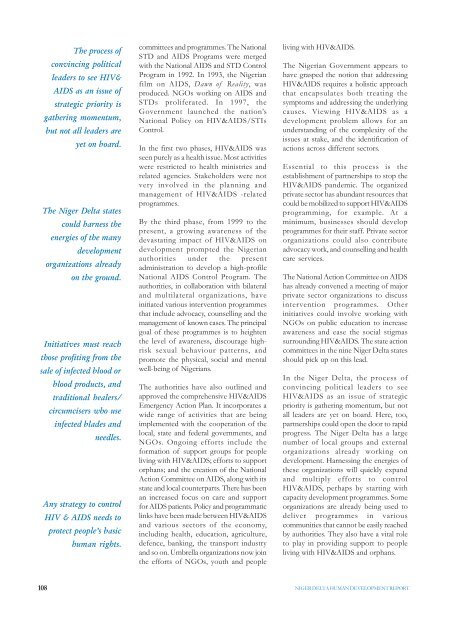Niger Delta Human Development Report - UNDP Nigeria - United ...
Niger Delta Human Development Report - UNDP Nigeria - United ...
Niger Delta Human Development Report - UNDP Nigeria - United ...
You also want an ePaper? Increase the reach of your titles
YUMPU automatically turns print PDFs into web optimized ePapers that Google loves.
The process of<br />
convincing political<br />
leaders to see HIV&<br />
AIDS as an issue of<br />
strategic priority is<br />
gathering momentum,<br />
but not all leaders are<br />
yet on board.<br />
The <strong>Niger</strong> <strong>Delta</strong> states<br />
could harness the<br />
energies of the many<br />
development<br />
organizations already<br />
on the ground.<br />
Initiatives must reach<br />
those profiting from the<br />
sale of infected blood or<br />
blood products, and<br />
traditional healers/<br />
circumcisers who use<br />
infected blades and<br />
needles.<br />
Any strategy to control<br />
HIV & AIDS needs to<br />
protect people’s basic<br />
human rights.<br />
committees and programmes. The National<br />
STD and AIDS Programs were merged<br />
with the National AIDS and STD Control<br />
Program in 1992. In 1993, the <strong>Niger</strong>ian<br />
film on AIDS, Dawn of Reality, was<br />
produced. NGOs working on AIDS and<br />
STDs proliferated. In 1997, the<br />
Government launched the nation’s<br />
National Policy on HIV&AIDS/STIs<br />
Control.<br />
In the first two phases, HIV&AIDS was<br />
seen purely as a health issue. Most activities<br />
were restricted to health ministries and<br />
related agencies. Stakeholders were not<br />
very involved in the planning and<br />
management of HIV&AIDS -related<br />
programmes.<br />
By the third phase, from 1999 to the<br />
present, a growing awareness of the<br />
devastating impact of HIV&AIDS on<br />
development prompted the <strong>Niger</strong>ian<br />
authorities under the present<br />
administration to develop a high-profile<br />
National AIDS Control Program. The<br />
authorities, in collaboration with bilateral<br />
and multilateral organizations, have<br />
initiated various intervention programmes<br />
that include advocacy, counselling and the<br />
management of known cases. The principal<br />
goal of these programmes is to heighten<br />
the level of awareness, discourage highrisk<br />
sexual behaviour patterns, and<br />
promote the physical, social and mental<br />
well-being of <strong>Niger</strong>ians.<br />
The authorities have also outlined and<br />
approved the comprehensive HIV&AIDS<br />
Emergency Action Plan. It incorporates a<br />
wide range of activities that are being<br />
implemented with the cooperation of the<br />
local, state and federal governments, and<br />
NGOs. Ongoing efforts include the<br />
formation of support groups for people<br />
living with HIV&AIDS; efforts to support<br />
orphans; and the creation of the National<br />
Action Committee on AIDS, along with its<br />
state and local counterparts. There has been<br />
an increased focus on care and support<br />
for AIDS patients. Policy and programmatic<br />
links have been made between HIV&AIDS<br />
and various sectors of the economy,<br />
including health, education, agriculture,<br />
defence, banking, the transport industry<br />
and so on. Umbrella organizations now join<br />
the efforts of NGOs, youth and people<br />
living with HIV&AIDS.<br />
The <strong>Niger</strong>ian Government appears to<br />
have grasped the notion that addressing<br />
HIV&AIDS requires a holistic approach<br />
that encapsulates both treating the<br />
symptoms and addressing the underlying<br />
causes. Viewing HIV&AIDS as a<br />
development problem allows for an<br />
understanding of the complexity of the<br />
issues at stake, and the identification of<br />
actions across different sectors.<br />
Essential to this process is the<br />
establishment of partnerships to stop the<br />
HIV&AIDS pandemic. The organized<br />
private sector has abundant resources that<br />
could be mobilized to support HIV&AIDS<br />
programming, for example. At a<br />
minimum, businesses should develop<br />
programmes for their staff. Private sector<br />
organizations could also contribute<br />
advocacy work, and counselling and health<br />
care services.<br />
The National Action Committee on AIDS<br />
has already convened a meeting of major<br />
private sector organizations to discuss<br />
intervention programmes. Other<br />
initiatives could involve working with<br />
NGOs on public education to increase<br />
awareness and ease the social stigmas<br />
surrounding HIV&AIDS. The state action<br />
committees in the nine <strong>Niger</strong> <strong>Delta</strong> states<br />
should pick up on this lead.<br />
In the <strong>Niger</strong> <strong>Delta</strong>, the process of<br />
convincing political leaders to see<br />
HIV&AIDS as an issue of strategic<br />
priority is gathering momentum, but not<br />
all leaders are yet on board. Here, too,<br />
partnerships could open the door to rapid<br />
progress. The <strong>Niger</strong> <strong>Delta</strong> has a large<br />
number of local groups and external<br />
organizations already working on<br />
development. Harnessing the energies of<br />
these organizations will quickly expand<br />
and multiply efforts to control<br />
HIV&AIDS, perhaps by starting with<br />
capacity development programmes. Some<br />
organizations are already being used to<br />
deliver programmes in various<br />
communities that cannot be easily reached<br />
by authorities. They also have a vital role<br />
to play in providing support to people<br />
living with HIV&AIDS and orphans.<br />
108 NIGER DELTA HUMAN DEVELOPMENT REPORT










